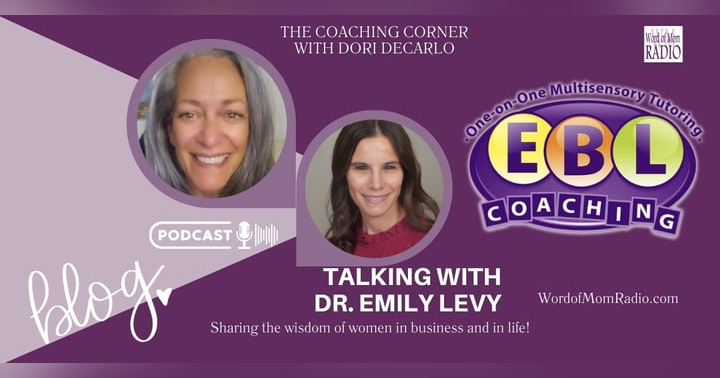Navigating Neurodiversity: Strategies for Parenting Teens with ADHD and Autism

Welcome to a deep dive into the world of neurodiversity, specifically focusing on strategies for parenting teenagers with ADHD, autism, and anxiety. As parents, we all want to provide the best possible support for our children, but navigating the complexities of neurodiversity can feel overwhelming. This blog post, inspired by our recent podcast episode featuring Jheri South, a teen and parenting coach, speaker, and ADHD specialist, aims to provide you with insights, practical strategies, and a sense of community. Jheri's personal experiences and professional expertise offer a beacon of hope and guidance for families on a similar journey. Listen to the full episode with Jheri South on The Mompreneur Model with Dori DeCarlo for an even richer understanding.
Understanding Neurodiversity in Teens
Neurodiversity refers to the natural variation in human brain function and behavioral traits. It posits that neurological differences like autism, ADHD, dyslexia, and others are normal human variations, rather than deficits. Understanding this concept is the first step towards effectively supporting your neurodivergent teen. It requires shifting your perspective from trying to "fix" or "cure" these differences to accepting and celebrating them. When we embrace neurodiversity, we create an environment where our teens can thrive and reach their full potential.
For teenagers, this understanding is particularly crucial. Adolescence is a time of significant change and self-discovery, and neurodivergent teens often face unique challenges in navigating social interactions, academic pressures, and emotional regulation. Recognizing that their brains process information differently can empower them to understand themselves better and advocate for their needs. As parents, we must educate ourselves about the specific neurodevelopmental conditions our teens may have, such as ADHD and autism, to provide targeted support.
Meet Jheri South: A Journey of Understanding and Advocacy
Jheri South is a powerhouse of knowledge and empathy in the realm of neurodiversity. As a mom to seven neurodivergent children and someone diagnosed with ADHD herself, Jheri brings both personal and professional expertise to her work as a teen and parenting coach. Her journey is one of resilience, understanding, and unwavering advocacy. Jheri's experiences navigating a marriage marked by pain and addiction, coupled with her son's suicide attempt, fueled her passion for helping teens and families overcome life's most difficult moments. Her story is a testament to the transformative power of coaching and the importance of community support.
Jheri's late diagnosis of ADHD at the age of 40 provided her with clarity and validation. It explained many of her past experiences, including her impulsivity, hyperfocus, and rejection sensitive dysphoria (RSD). This personal insight allows her to connect with her clients on a deeper level and offer tailored strategies for managing challenges and leveraging strengths. Jheri's approach emphasizes mindset, strategy, and community, recognizing that these three pillars are essential for success.
The Interplay of ADHD, Autism, and Anxiety in Teenagers
ADHD, autism, and anxiety often co-occur in teenagers, creating a complex web of challenges that require a nuanced understanding. ADHD can manifest as inattention, hyperactivity, and impulsivity, making it difficult for teens to focus in school, manage their time effectively, and control their emotions. Autism, on the other hand, is characterized by difficulties with social communication and interaction, as well as restricted or repetitive behaviors or interests. Many autistic teens also experience sensory sensitivities, which can lead to anxiety and overwhelm.
Anxiety is a common co-occurring condition in both ADHD and autism. Teens with ADHD may experience anxiety due to the challenges they face in meeting expectations and managing their impulsivity. Autistic teens may feel anxious in social situations or when faced with unexpected changes in routine. Understanding how these conditions interact is crucial for developing effective interventions. For example, a teen with ADHD and anxiety may benefit from a combination of medication, therapy, and accommodations in school. An autistic teen with anxiety may need support in developing social skills, managing sensory sensitivities, and learning coping strategies for dealing with stressful situations.
Mindset Matters: Cultivating a Positive Approach to Parenting
A positive mindset is paramount when parenting neurodivergent teens. It starts with accepting and celebrating their unique strengths and abilities. Instead of focusing on what they can't do, focus on what they can do, and create opportunities for them to shine. This positive approach not only boosts their self-esteem but also fosters a stronger parent-child relationship. Jheri South emphasizes the importance of reframing challenges as opportunities for growth. For instance, instead of viewing ADHD as a deficit, consider it a source of creativity, hyperfocus, and resilience.
Cultivating a growth mindset is also essential. Encourage your teen to embrace challenges, learn from mistakes, and persevere in the face of setbacks. Teach them that intelligence and abilities are not fixed traits but can be developed through effort and learning. This mindset empowers them to take risks, try new things, and believe in their potential. As parents, we must model this mindset ourselves, demonstrating resilience, optimism, and a willingness to learn and grow. This is especially true when navigating the ups and downs of parenting neurodivergent children.
Practical Strategies for Supporting Neurodivergent Teens
There are numerous practical strategies you can implement to support your neurodivergent teen. These strategies are tailored to address specific challenges related to ADHD, autism, and anxiety:
- Establish Structure and Routine: Consistent routines provide a sense of predictability and security for neurodivergent teens. Create a daily schedule that includes time for schoolwork, meals, activities, and relaxation.
- Provide Visual Supports: Visual aids, such as checklists, calendars, and timers, can help teens with ADHD and autism stay organized and manage their time effectively.
- Create a Sensory-Friendly Environment: Minimize distractions and sensory overload by creating a calm and quiet space for your teen to study, relax, or engage in activities. Consider using noise-canceling headphones, dim lighting, and soft textures.
- Teach Social Skills: Help your autistic teen develop social skills by practicing conversations, role-playing scenarios, and providing feedback on their social interactions.
- Encourage Self-Advocacy: Empower your teen to advocate for their needs by teaching them how to communicate their challenges and request accommodations in school and other settings.
- Promote Emotional Regulation: Help your teen develop strategies for managing their emotions, such as deep breathing exercises, mindfulness techniques, and cognitive reframing.
- Seek Professional Support: Don't hesitate to seek professional support from therapists, counselors, or coaches who specialize in working with neurodivergent teens and their families.
Building a Supportive Community: You're Not Alone
Parenting a neurodivergent teen can feel isolating at times, but it's crucial to remember that you're not alone. Building a supportive community of other parents, professionals, and mentors can provide you with valuable resources, insights, and emotional support. Connect with other parents through online forums, support groups, or local organizations. Sharing experiences, exchanging tips, and offering encouragement can make a significant difference in your journey.
Encourage your teen to connect with other neurodivergent individuals. Peer support can be incredibly beneficial for teens who may feel misunderstood or isolated. Connecting with others who share similar experiences can foster a sense of belonging, validation, and empowerment. Look for opportunities for your teen to participate in social groups, clubs, or activities that cater to their interests and strengths.
Jheri's Insights: Turning Challenges into Strengths
Jheri South's approach to parenting neurodivergent teens centers around turning challenges into strengths. She believes that by identifying and leveraging their unique abilities, we can help our teens thrive. For example, a teen with ADHD may struggle with attention in traditional classroom settings but excel in hands-on activities that allow them to move and engage their senses. An autistic teen may have difficulty with social interactions but possess exceptional talents in areas such as math, science, or art.
Jheri encourages parents to focus on their teen's strengths and provide opportunities for them to develop and showcase their talents. This approach not only boosts their self-esteem but also helps them discover their passions and purpose. By creating an environment where their strengths are celebrated and supported, we can empower our teens to overcome challenges and achieve their goals. Jheri emphasizes the importance of helping parents find the "magic" in their children. That special something that makes them who they are that can be fostered and grown.
Resources and Support: Connecting with Jheri South and Other Organizations
There are numerous resources and organizations available to support parents of neurodivergent teens. Jheri South offers coaching services, workshops, and speaking engagements to help families navigate the challenges of ADHD, autism, and anxiety. You can connect with Jheri through her website, JheriSouth.com, and follow her on Facebook and Instagram for valuable insights and tips.
In addition to Jheri's resources, consider exploring other organizations that provide support and information for families of neurodivergent teens. These include:
- The Autism Society: Offers resources, support, and advocacy for individuals with autism and their families.
- CHADD (Children and Adults with Attention-Deficit/Hyperactivity Disorder): Provides information, support, and advocacy for individuals with ADHD and their families.
- The Anxiety & Depression Association of America (ADAA): Offers resources, support, and education about anxiety and depression.
- Understood.org: Provides information, resources, and support for parents of children with learning and attention issues.
Empowering Neurodivergent Teens to Thrive
Ultimately, our goal as parents is to empower our neurodivergent teens to thrive. This means providing them with the tools, support, and opportunities they need to reach their full potential and live fulfilling lives. It starts with understanding and accepting their unique strengths and challenges. It requires cultivating a positive mindset, implementing practical strategies, and building a supportive community. It means advocating for their needs and empowering them to advocate for themselves.
By embracing neurodiversity, we create a world where our teens can feel valued, respected, and understood. We help them discover their passions, develop their talents, and overcome obstacles. We empower them to embrace their identities and live authentically. As Jheri South reminds us, our neurodivergent teens have the potential to make incredible contributions to the world. It's our job to help them shine.
We hope this blog post has provided you with valuable insights and strategies for parenting neurodivergent teens. Remember, you're not alone on this journey. By connecting with others, seeking professional support, and celebrating your teen's unique abilities, you can help them thrive. Be sure to listen to the full conversation with Jheri South on The Mompreneur Model with Dori DeCarlo for even more in-depth guidance and inspiration.




